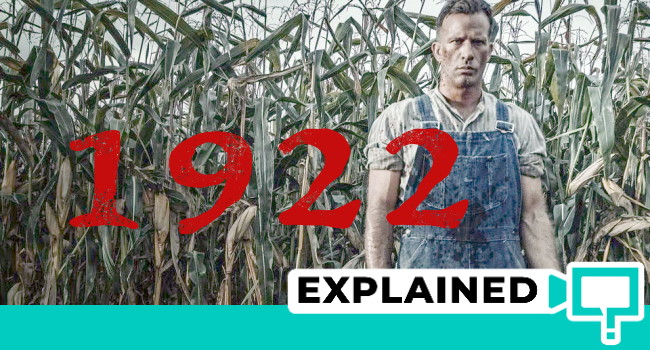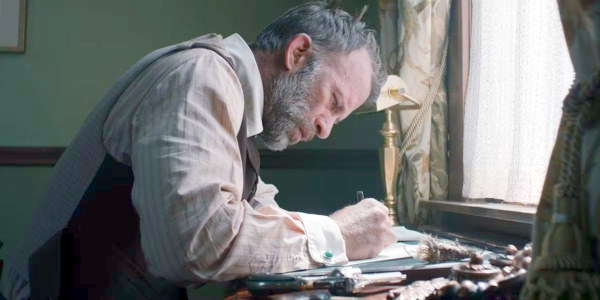Zak Hilditch’s 2017 adaptation of Stephen King’s novella 1992 is a psychological horror about crime and punishment. It delves deep into the effects of guilty consciousness, its manifestations, and its impact on the lives of perpetrators. This article will take you through the movie’s most important themes, motifs, and symbols. Here’s the plot and ending of the movie 1922 explained; spoilers ahead.
Hollywordle – Check out my new Hollywood Wordle game!
Where To Watch?
To find where to stream any movie or series based on your country, use This Is Barry’s Where To Watch.
Oh, and if this article doesn’t answer all of your questions, drop me a comment or an FB chat message, and I’ll get you the answer. You can find other film explanations using the search option on top of the site.
Contents
Here are links to the key aspects of the movie:
- – Plot Synopsis
- – The Theme of Crime and Punishment
- – The Recurring Motif of Irony
- – Symbols Explained
- – Rats
- – Blood
- – Ghosts
- – Ending Explained
1922 Movie: Plot Synopsis
1992 is a modern subversion of Crime and Punishment.
Wilfred (Wilf) James lives on a farm in Nebraska with his wife, Arlette, and their son Henry (Hank). Arlette hates farm life and intends to sell her part of the land (her dowry) and move to the city.
She unsuccessfully tries to convince Wilf to sell his share, as well, and move to the city with her, but this doesn’t really matter, seeing as how she has the final say by default. As a mother, 14-year-old Henry falls under her custody. She intends to sell the farm to a livestock company, whose operations would pollute even Wilf’s part of the property (making it infertile and useless).
Hank, who’s fallen in love with the neighboring farmer’s daughter, and Wilfred, who stands to lose everything if Arlette gets her way, plot to kill her. Because this happens on a remote farm, the duo successfully commits the crime, only to be haunted by their conscience.
In the end, Hank and his pregnant sweetheart are killed during a robbery (trying to mimic the life of Bonnie and Clyde). Wilf loses his property, his son, and, ultimately, his sanity, making the only logical conclusion that “In the end, we all get caught.”
1922 Movie: The Theme of Crime and Punishment
In Dostoyevsky’s Crime and Punishment, the Russian author deconstructs the concept of punishment in modern times. When we hear the word punishment, the majority of us immediately switch to thinking of legal consequences. Here, like in Dostoyevsky’s work, there are no legal consequences. Does this mean that the punishment is not present either? Of course not!
The fact that the three of them live on a remote farm is a perfect setup that, on its own, poses an additional temptation. After all, Wilf and Henry know they can easily evade being discovered. They would have a huge problem keeping this hidden if they lived in an apartment building or a tight-knit suburb. Even with the blinds on and effective sound absorbing panels on the walls, getting rid of the body unnoticed would be nearly impossible.
As we already said, a crime without a punishment seems tempting to them. However, this is only so because the two fail to consider different forms of punishment. Their guilty conscience turns out to be too heavy of a burden to bear and soon takes a toll on Wilf’s sanity.
The Recurring Motif of Irony
One of the most dominant motifs in the movie is irony. Wilf kills his wife to keep the farm but loses it anyway, mostly as a domino effect caused by the killing. When he falls ill, he becomes incapable of taking care of it, leading to its decay. Faced with this, Wilf gets indebted, and eventually, the farm ends up in the ownership of the livestock company that Arlette originally intended to sell her land. In other words, he lost everything and achieved no effect in the process.
Another of Wilf’s motives for the murder is his desire to keep his son on the farm. A combination of his actions and Henry’s guilty conscience eventually drive Henry away and to his death. Moreover, under the guise of protecting Henry (doing what’s best for him), Wilf involves his own son in one of the most heinous crimes imaginable.
Namely, Hank helps kill his mother for being an obstacle to his love for his sweetheart Shannon. However, when Shannon gets pregnant, both of their fathers refuse to permit them to wed, thus making his own sacrifice completely useless. So, after killing his wife and “driving away” his son, he remains alone on the farm.
Lastly, the most subtle example of irony is the fact that Wilf managed to avoid legal prosecution only to succumb to the judgment of his own consciousness.
1922 Movie: Symbols Explained
The film itself is filled with symbolism of all kinds. Here are the three most common and significant symbols in the movie 1922.
Rats
Rats are the manifestation of Wilf’s guilty consciousness. They first appear shortly after the murder and seem to come from where they buried Arlette. Symbolically, this represents their conscience sprouting from a buried secret.
Still, the nest soon seems to not matter, as we are shown that Wilf can never run away from rats, no matter where he stays or how far he goes. This just further goes to illustrate their role as the manifestation of his own guilt. A similar thing happens to Robert Pattinson’s Winslow in The Lighthouse (2019), where he cannot escape his past, no matter how far he goes to hide.
The form of a rat is not an accident either. Firstly, it’s a rodent towards which humans almost universally feel disgusted. A reaction of a guilty person feeling physical disgust when faced with their own crime is not unheard of.
The ending of the book and the movie are slightly different, seeing as how, in the movie 1922, it appears as if Wilf is devoured by rats. The same happens in the book, with a brief clarification that all the “rats” bite marks on his body were actually self-inflicted. In other words, in the book, King tells us more directly that Wilf is delusional rather than faced with some sort of supernatural punishment.
Blood
Right after the murder, Wilf and Hank seem shocked at how much work it takes to destroy the evidence of the murder. All the packing, lying, coming up with an alibi, and, finally, removing blood are incredibly difficult. The motif of the guilty party’s inability to remove blood is prevalent in literature. For instance, when driven mad by her conscience, Shakespeare’s Lady Macbeth compulsively scrubs her (physically clean) hands, believing she can never wash off the blood.
Even though they manage to conceal the murder from the world, they can never hide it from themselves. In other words, while no one else can see the blood on their hands, all three of them (Hank, Wilf, and Lady Macbeth) know it’s there.
Ghosts
Throughout the story, Wilf encounters two ghosts – Arlette’s and Hank’s. What these two ghosts have in common is the fact that they:
- Appear when he’s alone
- Represent people whose lives were directly ruined by Wilf’s decisions
Based on these two features, it would be logical to conclude that the ghosts represent his guilty conscience, similar to the above-discussed rats. The problem is that these ghosts have one more supernatural feature:
- Omniscience
Hank’s ghost knows the exact time and manner of Hank’s death, while Arlette’s ghost knows the conditions of Hank’s death (the event that neither she nor Wilf was present at). Here, both the author and the director leave some room for the supernatural, speculating that this might also be some sort of a divine punishment sent upon Wilf.
1922 Movie Ending Explained
The ending of the movie 1922 shows us that Wilf has lost his mind due to the guilt of murdering his wife and pushing away his son. His greed makes him lose everything, and he dies a slow death haunted by his conscience.
Finally, while definitely terrifying and a powerful deterrent, legal action is not the only thing keeping people from engaging in crime. Our own conscience can have just as menacing of a presence, even for those whose moral compass doesn’t seem to function at times. This is precisely what both King and Hilditch did their best to show.
What were your thoughts on the plot and ending of the movie 1922? Drop your comments in the section below.

Stacey is a talented freelance writer passionate about all things pop culture. She has a keen eye for detail and a natural talent for storytelling. She’s a super-fan of Game of Thrones, Cats, and Indie Rock Music and can often be found engrossed in complex films and books. Connect with her on her social media handles to learn more about her work and interests.


